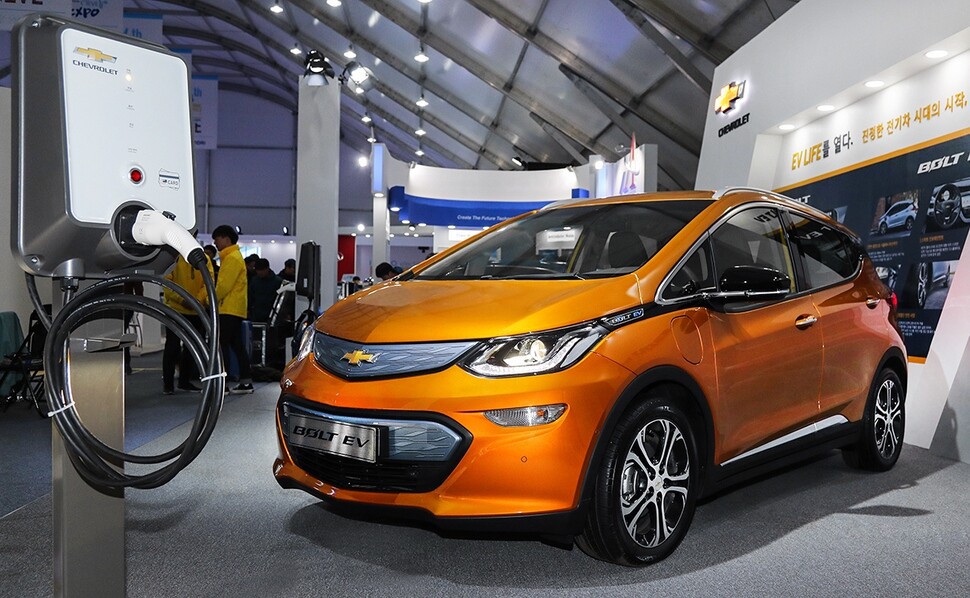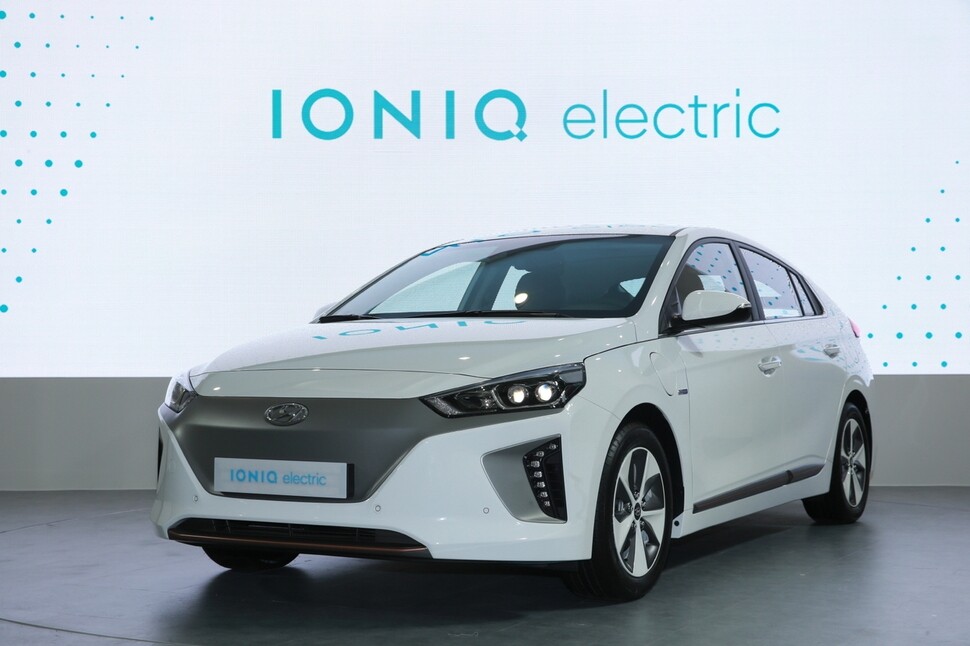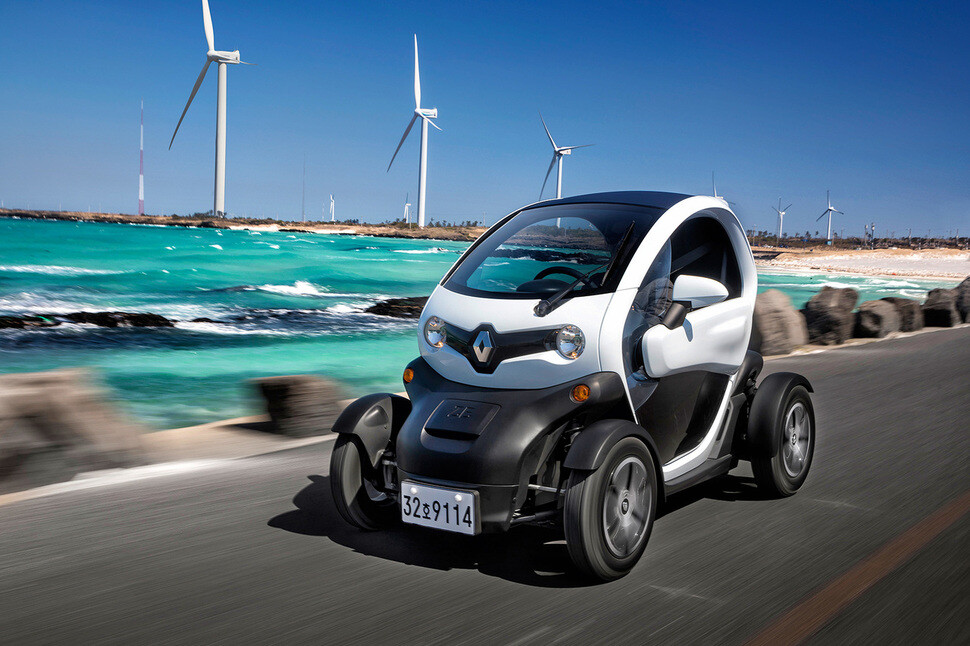hankyoreh
Links to other country sites 다른 나라 사이트 링크
South Korea’s electric car market growing, but still in infancy

In 2016, more than 1.54 million automobiles were sold in South Korea, 5,914 of which were electric cars. If all the electric cars currently in operation in the country were added up, there would be fewer than 10,000. Considering that there are more than 500,000 electric cars being driven in the US, it’s no exaggeration to say that the South Korean electric car industry is still in its infancy. When the South Korean government announced the ambitious policy of putting one million vehicles on the market in 2010, it seemed as if the electric car market was imminent, but the reality has turned out to be far different.
While the domestic electric market has been sluggish, there are signs of change. A number of vehicles around the moderate price range of 20 million won (US$17,775) when central and local government incentives are factored in) are being released, and US electric car manufacturer Tesla has jumped into the domestic market, piquing customers’ interest.
During pre-sale event for the Bolt EV, which GM Korea is importing from the US, on Mar. 17, all the available cars sold out in just one hour. The Bolt is an all-electric car that is manufactured and sold by General Motors under the Chevrolet brand. The Bolt can drive for 383 km on a single charge - longer than any electric car currently on sale in South Korea. While the car has a steep price tag of 47.79 million won (US$42,400), the actual cost to consumers drops to the 21 million won range, when the central government incentive of 14 million won and local government incentives of up to 12 million won are factored in.

For now, GM Korea seems to have succeeded in its plans to create a sensation prior to the vehicle’s release next month. “The Bolt will be a gamechanger in the electric car market,” said James Kim, president of GM Korea. “The car‘s ability to drive twice as far as its competitors, its reasonable price and its cutting-edge technology are expected to usher in the next generation of the electric car market.”
The Bolt is expected to shock the South Korean electric car market out of its stupor, making this year a turning point for the market. Currently, there are eight electric vehicle models on sale in South Korea, including the Ioniq (Hyundai), Ray (Kia), Soul (Kia), SM3 Z.E. (Renault Samsung), Spark (GM Korea), i3 (BMW) and the Leaf (Nissan).
Renault Samsung is also gearing up to release its tiny Twizy in South Korea. Categorized as a compact car, this electric vehicle can be driven on ordinary roads that have a maximum speed of 80 km/h.
The electric vehicle with the biggest sales last year was Hyundai’s Ioniq, which dominates the market, with a share of 63%. Renault Samsung’s SME Z.E. and Kia’s Soul are vying for second place, while BMW’s i3 is trailing in third. While the domestic electric vehicle market has been led by Hyundai, Kia and Renault Samsung, the appearance of the Chevrolet Bolt is bringing in some serious competition.

When Hyundai released the Ioniq in June 2016, it promised to “inaugurate an era of electric vehicles for the masses.” During the International Electric Vehicle Expo, which opened at Jeju Island last week, Hyundai announced its strategy of expanding the electric vehicle market, focusing on the Ioniq Electric. Following the announcement, the company unveiled the Ioniq Electric “I” Trim, which offers more value for money. The car can be bought for 18.4 million won after incentives from Jeju government, making it 1.6 million won cheaper than the previous “N” Trim. Models such as this with a final purchase price around 20 million won are more likely to have mass appeal than the pricey electric vehicles sold by Tesla for well over 100 million won (US$88,800).
There are still many practical obstacles to overcome before electric vehicles can fully mature. One remaining headache is the shortage of charging stations. While the government has recently taken the lead in subsidizing such infrastructure, South Korea is still far behind global leaders such as the US and Japan. Nevertheless, the emergence of new models featuring advanced technology and reasonable prices hints at the possibility of growth in the electric vehicle market.
“The correction of technical weaknesses and the release of electric cars by various automakers suggest we’re entering an era of radically different electric vehicles,” said Kim Pil-su, a professor of automotive engineering at Daelim University College.
By Hong Dae-seon, staff reporter
Please direct questions or comments to [english@hani.co.kr]

Editorial・opinion
![[Column] Park Geun-hye déjà vu in Yoon Suk-yeol [Column] Park Geun-hye déjà vu in Yoon Suk-yeol](https://flexible.img.hani.co.kr/flexible/normal/500/300/imgdb/original/2024/0424/651713945113788.jpg) [Column] Park Geun-hye déjà vu in Yoon Suk-yeol
[Column] Park Geun-hye déjà vu in Yoon Suk-yeol![[Editorial] New weight of N. Korea’s nuclear threats makes dialogue all the more urgent [Editorial] New weight of N. Korea’s nuclear threats makes dialogue all the more urgent](https://flexible.img.hani.co.kr/flexible/normal/500/300/imgdb/original/2024/0424/7317139454662664.jpg) [Editorial] New weight of N. Korea’s nuclear threats makes dialogue all the more urgent
[Editorial] New weight of N. Korea’s nuclear threats makes dialogue all the more urgent- [Guest essay] The real reason Korea’s new right wants to dub Rhee a founding father
- [Column] ‘Choson’: Is it time we start referring to N. Korea in its own terms?
- [Editorial] Japan’s rewriting of history with Korea has gone too far
- [Column] The president’s questionable capacity for dialogue
- [Column] Are chaebol firms just pizza pies for families to divvy up as they please?
- [Column] Has Korea, too, crossed the Rubicon on China?
- [Correspondent’s column] In Japan’s alliance with US, echoes of its past alliances with UK
- [Editorial] Does Yoon think the Korean public is wrong?
Most viewed articles
- 1‘We must say no’: Seoul defense chief on Korean, USFK involvement in hypothetical Taiwan crisis
- 2Will NewJeans end up collateral damage in internal feud at K-pop juggernaut Hybe?
- 3[Column] Park Geun-hye déjà vu in Yoon Suk-yeol
- 4Why Korea shouldn’t welcome Japan’s newly beefed up defense cooperation with US
- 5Thursday to mark start of resignations by senior doctors amid standoff with government
- 6N. Korean hackers breached 10 defense contractors in South for months, police say
- 7[Guest essay] The real reason Korea’s new right wants to dub Rhee a founding father
- 8[Column] ‘Choson’: Is it time we start referring to N. Korea in its own terms?
- 9Kim Jong-un expressed ‘satisfaction’ with nuclear counterstrike drill directed at South
- 10[Editorial] New weight of N. Korea’s nuclear threats makes dialogue all the more urgent